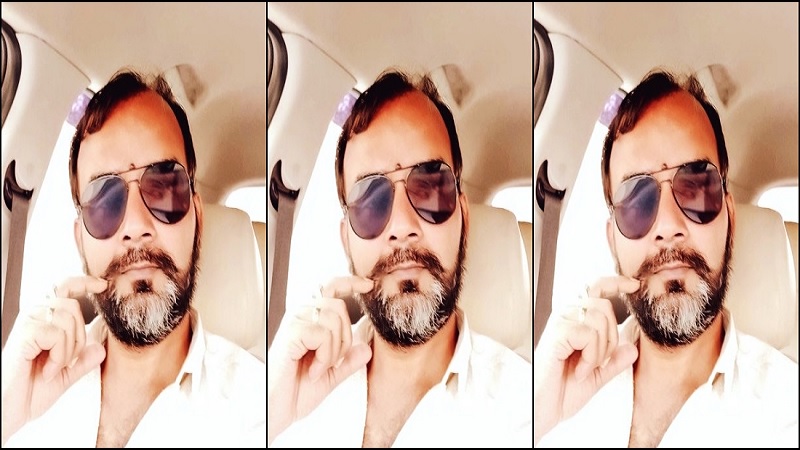For what feels like the umpteenth time, the X account of notorious hate-monger Deepak Sharma has been suspended. Known for his virulent diatribes, Sharma’s social media presence has long been a platform for inciting hate and stoking communal tensions, with a particular focus on targeting minorities, especially the Muslim community. His account has repeatedly violated the platform’s community guidelines, leading to numerous suspensions over the years. Yet, Sharma’s online return after each ban has been as predictable as it is troubling, revealing a disturbing cycle of unchecked hatred that thrives in the digital age.
Sharma’s posts, often riddled with Islamophobic slurs, disinformation, and calls to violence, have made him a polarising figure. While many applaud the repeated suspension of his account, calling it a step towards curbing hate speech online, critics argue that social media platforms like X have failed to permanently ban individuals like Sharma, allowing their platforms to become breeding grounds for dangerous ideologies.
His following, although controversial, remains loyal and vocal, amplifying his messages of bigotry across various corners of the internet, even during his suspensions. This digital army of followers, emboldened by Sharma’s provocations, perpetuates a toxic environment where minorities feel increasingly unsafe.
What makes Sharma’s case particularly alarming is the larger context it exists within. In an era where communal violence is on the rise and inflammatory rhetoric seems to seep into the mainstream, the continued presence of figures like him raises serious questions about the responsibility social media platforms have in curbing hate speech. Suspending accounts like Sharma’s temporarily may offer short-lived relief, but it does little to address the root of the problem: the ability of individuals to exploit digital spaces to further their agenda of hate.
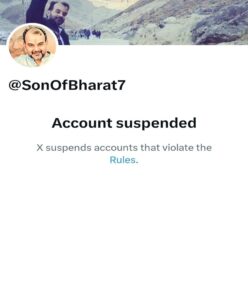
It’s important to highlight that after the suspension of his main account, Deepak Sharma circumvented the ban by creating another account on X. Through this new account, he continued to post a stream of equally offensive, violent, and anti-Islamic content, further perpetuating his hateful rhetoric without pause. However, the said side account also got suspended today morning.
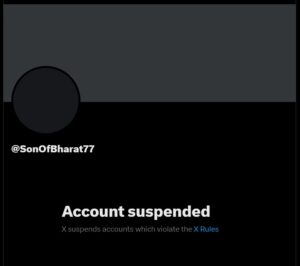
Another side account of Sharma’s, namely @sonofbharat7D was also suspended.
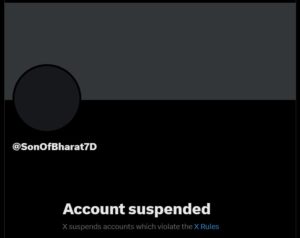
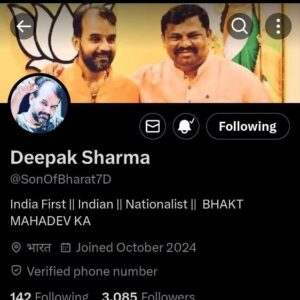
Who is Deepak Sharma?
Deepak Sharma, who claims to be an interior designer by profession, is far better known for his inflammatory, communal rhetoric than for any design work. Originally from Jaipur, Sharma has established himself as a prominent Hindu activist, though police records show he actually resides in Hathras, Uttar Pradesh. He is the founder of the Rashtriya Swabhimaan Dal (RSD), an organisation that, according to him, is dedicated to defending Hinduism and safeguarding national interests.
Sharma first gained notoriety through a disturbing video in which he attacked a defenceless boy on camera for allegedly creating ‘memes’ that mocked Hindu gods and goddesses. In his defence, Sharma claimed the violent Facebook live stream was meant to “raise awareness.” His early online presence was marked by bizarre, sometimes incoherent statements that many found either amusing or baffling.
Sharma’s rise to internet fame began with an angry video where he defensively listed his academic qualifications—boasting of a degree in Microbiology, a Master’s in Interior Design, and an MBA in Interior Design Management—in response to critics who questioned his education. Ironically, this video led to a flood of memes mocking his comments on “secular Hindus” and his self-proclaimed achievements.
However, what began as eccentric behaviour on social media quickly took a darker turn. Sharma moved from being an online oddity to a figure inciting communal violence, leaving behind a disturbing trail of incidents that have further deepened the divide in an already polarised society.
Previous offensive statements made by Deepak Sharma
In 2018, CJP’s Hate Watch team conducted an analysis of Deepak Sharma’s disruptive actions and hate speeches in Uttar Pradesh, revealing the various personas he has adopted. Even then, his animosity towards Muslims was evident, reflecting the same level of hatred he displays today. Sharma has made headlines for attempting to perform Hindu prayers at the Taj Mahal, launching verbal attacks against Muslims in his video rants, and even dabbling in poetry that calls for “another Godhra.”
Citizens for Justice and Peace (CJP) was among the first to raise concerns about Deepak Sharma’s social media activities, flagging his profile to the National Human Rights Commission (NHRC) on December 27, 2018. The report highlighted his biased, inflammatory posts, which were not only factually dubious but also deeply insensitive. CJP also filed a complaint with Facebook, which led to Sharma being banned from the platform. However, this did little to stop him. He repeatedly created new pages under different names, continuing to amass followers and incite similar hate.
Sharma has made shocking calls for the beheading of non-believers and openly expressed a desire for more incidents like the 2002 Godhra riots. His social media presence is rife with abusive, hate-filled posts, where he portrays himself as a “Nationalist!! Son of Bharat Mata!! Political Thinker” and proudly declares himself the founder of the Rashtriya Swabhiman Dal (RSD).
In 2021, Deepak Sharma ignited a storm of controversy with a provocative tweet, declaring, “अगर भोले के भक्त ‘तांडव’ पे उतरे तो वो तांडव तुमसे झेला न जाएगा – जिहादियों सहमत – RT,” which translates to, “If the devotees of Shiva begin the Tandav, or the dance of destruction, you jihadis (referring to Muslims) won’t be able to withstand it.” He then encouraged his followers to amplify this threat by retweeting it. The post garnered nearly 4,000 retweets and around 10,000 likes, signalling the alarming reach of his incendiary rhetoric.
Even more concerning were the 500 comments the tweet received, many of which called for the murder of Muslims, whom Sharma and his followers label as ‘jihadis.’ This tweet was part of a broader campaign by Sharma, in line with the right-wing agenda targeting the fictional web series Tandav, which had been accused of offending Hindu sentiments through its storyline. Sharma seized the controversy to push for what he described as an “anti-blasphemy” law, further stoking the flames of communal discord. His calls for violence and intolerance highlight the dangerous intersection of social media influence and hate-driven agendas.
Far from being a mere provocateur, Sharma has turned full-time hate-mongering into his profession. He joined Twitter in February 2020 and rapidly built a large following. His account has consistently featured hateful and abusive content, often drawing support from BJP MLA T Raja, a habitual hate speech offender himself.
A profile on his hateful propaganda may be watched here.
Here is a video by CJP explaining how he has misused Facebook as a platform.
It is essential to highlight here that Deepak Sharma’s Facebook account is still there, though the last post on it was made in the year 2022. It contains a similar type of anti-Muslim vitriolic as is there on his other social media accounts.
A particularly telling reflection on Sharma had then come from the mother of Shivam Vashisht, one of his associates who tragically died in an accident. She expressed her disdain for Sharma, stating, “He is a traitor; he profited off my son’s name after his death… I had no idea he was such a lowlife.” This sentiment underscores the damaging impact Sharma has had on those around him, further highlighting the depths of his exploitation and the real-world consequences of his hateful rhetoric. (A video on the same may be viewed here.)
Inaction on complaints made against Sharma for his offensive statements
CJP also lodged a complaint with the National Commission for Minorities (NCM) after Sharma made derogatory comments about Allah in an audio chat room on the social app ‘Clubhouse.’ During this session, Sharma launched into a vulgar tirade about the anatomy and biology of Allah, remarks so offensive that they cannot be repeated in print. In June 2021, CJP submitted a screen recording of this audio chatroom to the NCM, highlighting Sharma’s offensive comments in a room titled Mahadev ko gaali India mein legal (Translation: Insulting Mahadev is legal in India). The complaint stressed how Sharma has been exploiting social media platforms to gain followers, despite his deeply questionable credentials.
CJP’s complaint to the National Commission for Minorities (NCM) had also exposed how the Uttar Pradesh police have been accommodating several of Deepak Sharma’s requests, filing First Information Reports (FIRs) against social media users for allegedly joking about the “Shivling,” a revered symbol in Hinduism. These jokes emerged after claims surfaced that a “Shivling” was discovered in the compound of the Gyanvapi mosque, although mosque authorities contend that it was simply part of an old, defunct fountain. This “Shivling” versus fountain narrative fuelled a wave of humour on Twitter, prompting Sharma to take it upon himself to report individuals who participated in the jokes.
In a series of tweets, Sharma had not only shared screenshots of these posts but also identified users, effectively reporting them to the police and instructing law enforcement on how to respond. He then celebrated his “victories” as FIRs were filed against those he had singled out, particularly targeting Muslim users.
What was particularly shocking is that the Uttar Pradesh police had allegedly permitted Sharma to instigate these criminal complaints. They had responded with remarkable speed to his grievances regarding a few jokes, while completely neglecting to take action against Sharma himself, despite his blatant human rights violations and his inflammatory rhetoric aimed at inciting communal discord and outrage among Muslim minorities. This disparity highlights a disturbing trend in which law enforcement appears to be complicit in targeting individuals for exercising their right to free expression while ignoring the hate speech propagated by figures like Sharma.
Notably, in response to the complaint sent by CJP, the NCM took up the issue. In a letter dated July 29, 2022, the Commission directed the Superintendent of Police in Amroha, Uttar Pradesh, to investigate the matter and provide a detailed report on Sharma’s activities.
Series of suspensions, series of accounts
It’s important to highlight that before the suspension of his most recent account, Deepak Sharma had a previous “main” Twitter handle, @TheDeepak2020, which was suspended in 2022 following mass reporting. This account, like his others, was notorious for spreading hateful content and inciting violence, particularly against Muslim communities. The suspension came as a result of widespread outcry, with users reporting his posts for promoting communal tensions and violating Twitter’s policies on hate speech.
However, Sharma’s pattern of creating new accounts after each suspension reveals a troubling loophole in the enforcement mechanisms of social media platforms. Despite repeated violations, Sharma has been able to re-emerge under different guises, circumventing bans and continuing to build a substantial following. This ongoing cycle of suspensions followed by new accounts points to a larger issue: the failure of platforms like Twitter to permanently de-platform habitual offenders who misuse the space to incite hate.
The ease with which Sharma has managed to return time and again not only undermines the effectiveness of social media policies but also emboldens others like him. Each suspension may temporarily silence him, but the absence of more stringent measures allows him to regroup and resume his campaign of hate, once again mobilising his supporters. This cycle raises serious concerns about the platforms’ accountability in preventing the spread of communal violence and hate speech in digital spaces.
The disturbing influence of Deepak Sharma: A catalyst for communal hatred in society
Deepak Sharma exemplifies a shameless purveyor of hatred within our society, leveraging social media platforms to amplify his vitriolic messages. His history of inflammatory rhetoric reveals a consistent pattern of targeting minorities, particularly Muslims, under the guise of “Hindutva activism”. Despite numerous suspensions from social media for his hateful speech, he persists in creating new accounts, circumventing bans while continuing to mobilise supporters around a deeply divisive agenda.
From his early days of instigating violence by physically assaulting a young boy over memes to his calls for the beheading of non-believers, Sharma’s actions reflect a disturbing disregard for the values of tolerance and respect that are essential in a diverse society. His inflammatory comments surrounding sensitive issues, such as the alleged discovery of a “Shivling” at the Gyanvapi mosque, serve to incite communal tensions rather than foster dialogue.
Sharma’s audacity is further exemplified by his attempts to monetise tragedy, as evidenced by the accusations from the mother of his associate, who criticised him for profiting off her son’s death. This exploitation of personal loss underscores a deeper moral bankruptcy, revealing how Sharma shamelessly capitalises on suffering to perpetuate his hateful narrative.
Moreover, his interactions with law enforcement raise alarming questions about complicity and accountability. CJP’s reports indicate that the Uttar Pradesh police have acted swiftly on his complaints against individuals joking about religious symbols while ignoring the hate speech he spews. This selective enforcement emboldens Sharma, allowing him to continue his campaign of hatred with impunity.
In a time when society grapples with issues of communal harmony and respect for diversity, Deepak Sharma stands as a stark reminder of the dangerous consequences of unchecked hatred and the critical need for collective action against such divisive forces. His relentless efforts to spread animosity not only threaten the fabric of social cohesion but also pose a significant challenge to the principles of justice and equality that should guide our society.
Related:
Deepak Sharma is back on Twitter
CJP moves NCM against Deepak Sharma for derogatory remarks against Allah online!
